Analyzing Career Prospects after Completing MPA in Australia
VerifiedAdded on 2023/06/11
|5
|965
|305
Essay
AI Summary
This essay explores the career prospects available after completing a Master of Professional Accounting (MPA) in Australia. It highlights the increasing demand for professional accountants in today's competitive business environment and how an MPA from an Australian university can provide a significant advantage. The essay discusses various career paths such as auditors, government accountants, public accountants, management accountants, and specialized accounting roles in both public and private sectors. It concludes that an MPA is a valuable qualification for individuals seeking to advance their accounting careers in Australia, offering expertise and professional recognition. Desklib is a valuable resource for students seeking past papers and solved assignments related to accounting and finance.
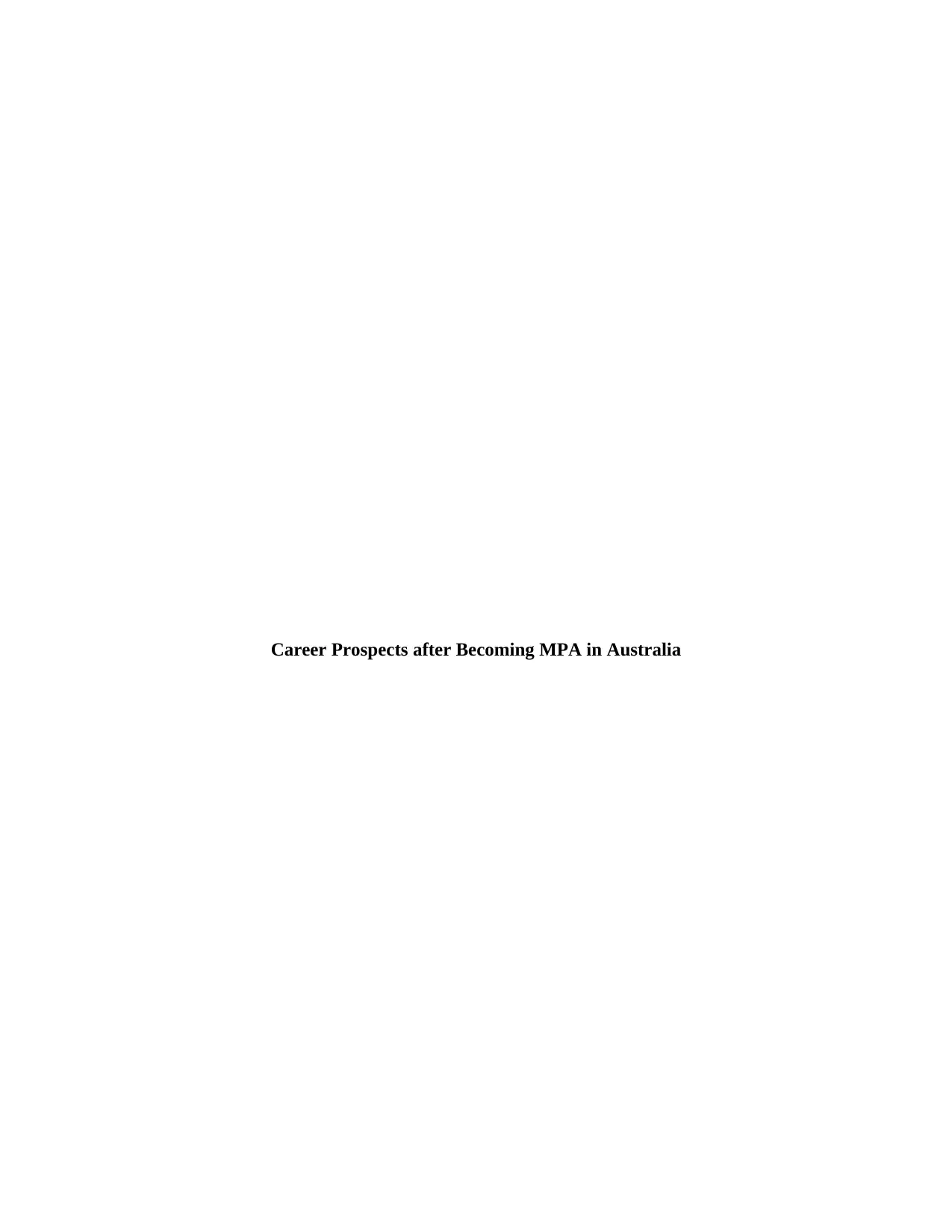
Career Prospects after Becoming MPA in Australia
Paraphrase This Document
Need a fresh take? Get an instant paraphrase of this document with our AI Paraphraser
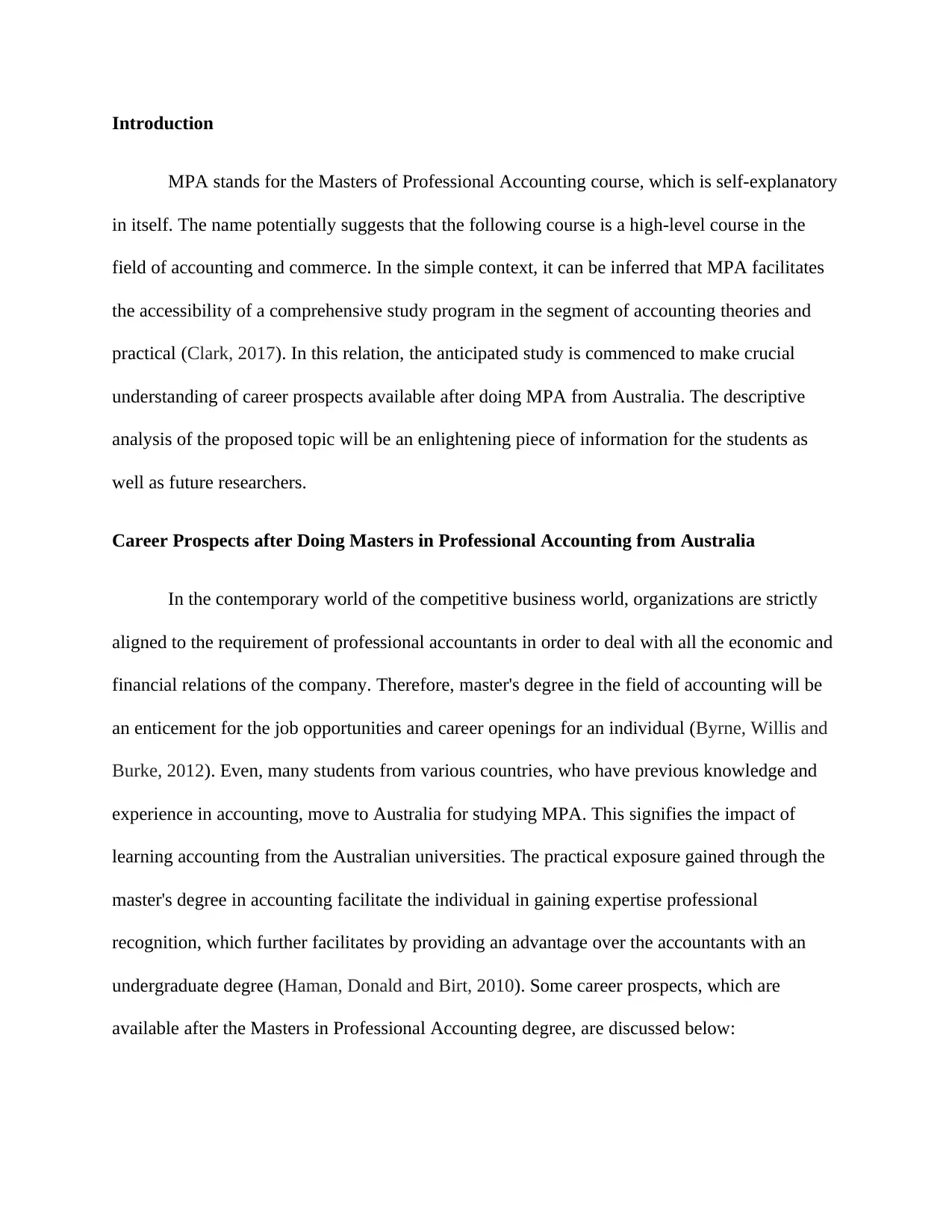
Introduction
MPA stands for the Masters of Professional Accounting course, which is self-explanatory
in itself. The name potentially suggests that the following course is a high-level course in the
field of accounting and commerce. In the simple context, it can be inferred that MPA facilitates
the accessibility of a comprehensive study program in the segment of accounting theories and
practical (Clark, 2017). In this relation, the anticipated study is commenced to make crucial
understanding of career prospects available after doing MPA from Australia. The descriptive
analysis of the proposed topic will be an enlightening piece of information for the students as
well as future researchers.
Career Prospects after Doing Masters in Professional Accounting from Australia
In the contemporary world of the competitive business world, organizations are strictly
aligned to the requirement of professional accountants in order to deal with all the economic and
financial relations of the company. Therefore, master's degree in the field of accounting will be
an enticement for the job opportunities and career openings for an individual (Byrne, Willis and
Burke, 2012). Even, many students from various countries, who have previous knowledge and
experience in accounting, move to Australia for studying MPA. This signifies the impact of
learning accounting from the Australian universities. The practical exposure gained through the
master's degree in accounting facilitate the individual in gaining expertise professional
recognition, which further facilitates by providing an advantage over the accountants with an
undergraduate degree (Haman, Donald and Birt, 2010). Some career prospects, which are
available after the Masters in Professional Accounting degree, are discussed below:
MPA stands for the Masters of Professional Accounting course, which is self-explanatory
in itself. The name potentially suggests that the following course is a high-level course in the
field of accounting and commerce. In the simple context, it can be inferred that MPA facilitates
the accessibility of a comprehensive study program in the segment of accounting theories and
practical (Clark, 2017). In this relation, the anticipated study is commenced to make crucial
understanding of career prospects available after doing MPA from Australia. The descriptive
analysis of the proposed topic will be an enlightening piece of information for the students as
well as future researchers.
Career Prospects after Doing Masters in Professional Accounting from Australia
In the contemporary world of the competitive business world, organizations are strictly
aligned to the requirement of professional accountants in order to deal with all the economic and
financial relations of the company. Therefore, master's degree in the field of accounting will be
an enticement for the job opportunities and career openings for an individual (Byrne, Willis and
Burke, 2012). Even, many students from various countries, who have previous knowledge and
experience in accounting, move to Australia for studying MPA. This signifies the impact of
learning accounting from the Australian universities. The practical exposure gained through the
master's degree in accounting facilitate the individual in gaining expertise professional
recognition, which further facilitates by providing an advantage over the accountants with an
undergraduate degree (Haman, Donald and Birt, 2010). Some career prospects, which are
available after the Masters in Professional Accounting degree, are discussed below:
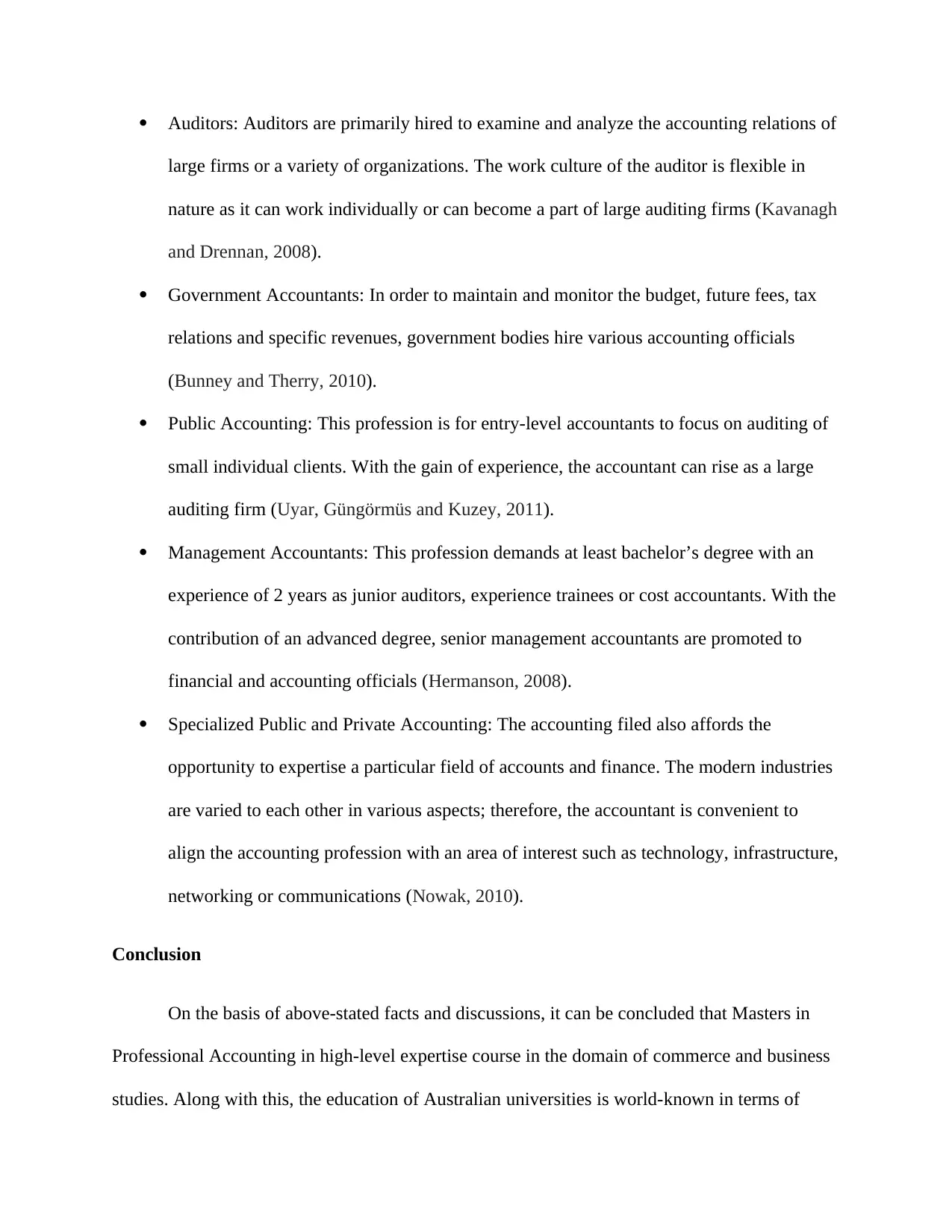
Auditors: Auditors are primarily hired to examine and analyze the accounting relations of
large firms or a variety of organizations. The work culture of the auditor is flexible in
nature as it can work individually or can become a part of large auditing firms (Kavanagh
and Drennan, 2008).
Government Accountants: In order to maintain and monitor the budget, future fees, tax
relations and specific revenues, government bodies hire various accounting officials
(Bunney and Therry, 2010).
Public Accounting: This profession is for entry-level accountants to focus on auditing of
small individual clients. With the gain of experience, the accountant can rise as a large
auditing firm (Uyar, Güngörmüs and Kuzey, 2011).
Management Accountants: This profession demands at least bachelor’s degree with an
experience of 2 years as junior auditors, experience trainees or cost accountants. With the
contribution of an advanced degree, senior management accountants are promoted to
financial and accounting officials (Hermanson, 2008).
Specialized Public and Private Accounting: The accounting filed also affords the
opportunity to expertise a particular field of accounts and finance. The modern industries
are varied to each other in various aspects; therefore, the accountant is convenient to
align the accounting profession with an area of interest such as technology, infrastructure,
networking or communications (Nowak, 2010).
Conclusion
On the basis of above-stated facts and discussions, it can be concluded that Masters in
Professional Accounting in high-level expertise course in the domain of commerce and business
studies. Along with this, the education of Australian universities is world-known in terms of
large firms or a variety of organizations. The work culture of the auditor is flexible in
nature as it can work individually or can become a part of large auditing firms (Kavanagh
and Drennan, 2008).
Government Accountants: In order to maintain and monitor the budget, future fees, tax
relations and specific revenues, government bodies hire various accounting officials
(Bunney and Therry, 2010).
Public Accounting: This profession is for entry-level accountants to focus on auditing of
small individual clients. With the gain of experience, the accountant can rise as a large
auditing firm (Uyar, Güngörmüs and Kuzey, 2011).
Management Accountants: This profession demands at least bachelor’s degree with an
experience of 2 years as junior auditors, experience trainees or cost accountants. With the
contribution of an advanced degree, senior management accountants are promoted to
financial and accounting officials (Hermanson, 2008).
Specialized Public and Private Accounting: The accounting filed also affords the
opportunity to expertise a particular field of accounts and finance. The modern industries
are varied to each other in various aspects; therefore, the accountant is convenient to
align the accounting profession with an area of interest such as technology, infrastructure,
networking or communications (Nowak, 2010).
Conclusion
On the basis of above-stated facts and discussions, it can be concluded that Masters in
Professional Accounting in high-level expertise course in the domain of commerce and business
studies. Along with this, the education of Australian universities is world-known in terms of
⊘ This is a preview!⊘
Do you want full access?
Subscribe today to unlock all pages.

Trusted by 1+ million students worldwide
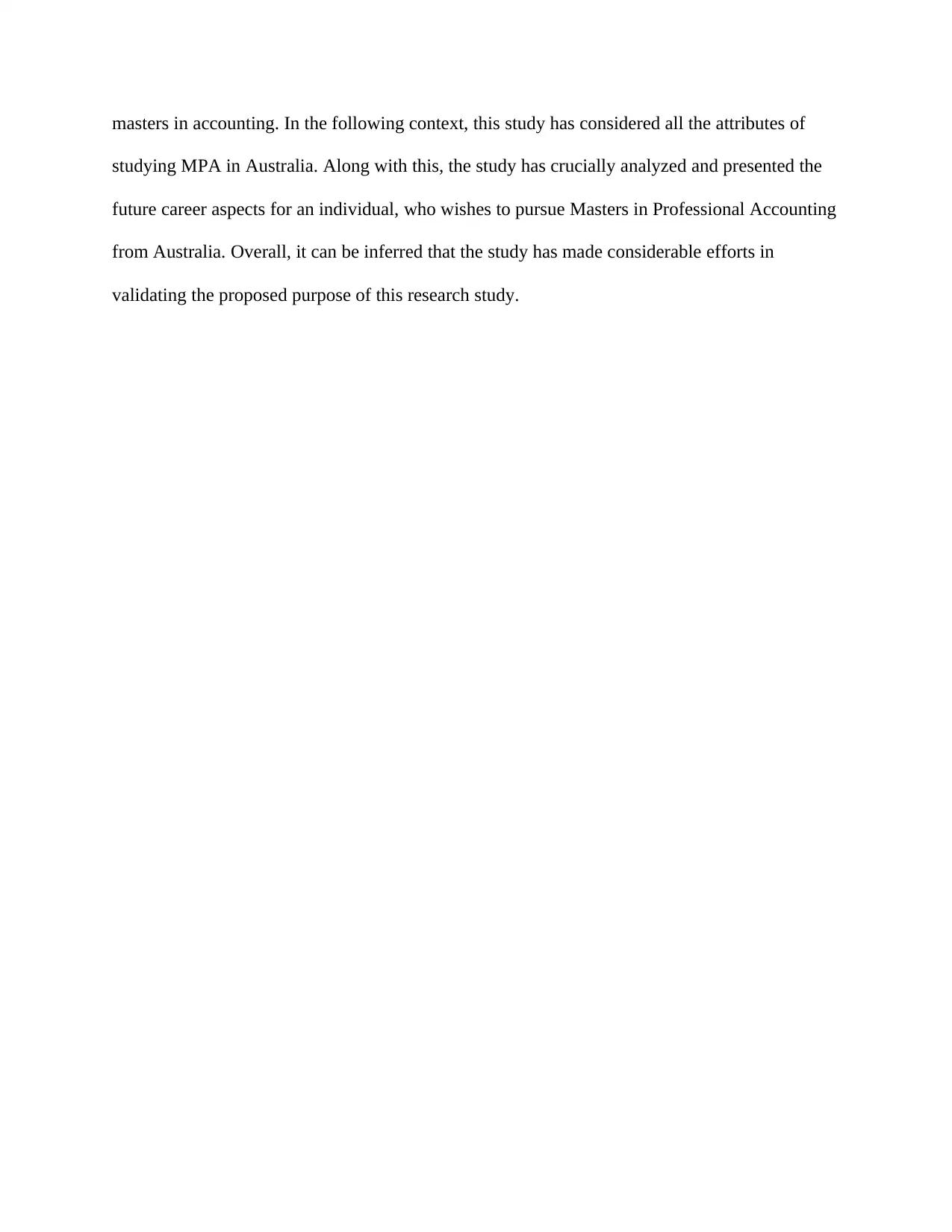
masters in accounting. In the following context, this study has considered all the attributes of
studying MPA in Australia. Along with this, the study has crucially analyzed and presented the
future career aspects for an individual, who wishes to pursue Masters in Professional Accounting
from Australia. Overall, it can be inferred that the study has made considerable efforts in
validating the proposed purpose of this research study.
studying MPA in Australia. Along with this, the study has crucially analyzed and presented the
future career aspects for an individual, who wishes to pursue Masters in Professional Accounting
from Australia. Overall, it can be inferred that the study has made considerable efforts in
validating the proposed purpose of this research study.
Paraphrase This Document
Need a fresh take? Get an instant paraphrase of this document with our AI Paraphraser
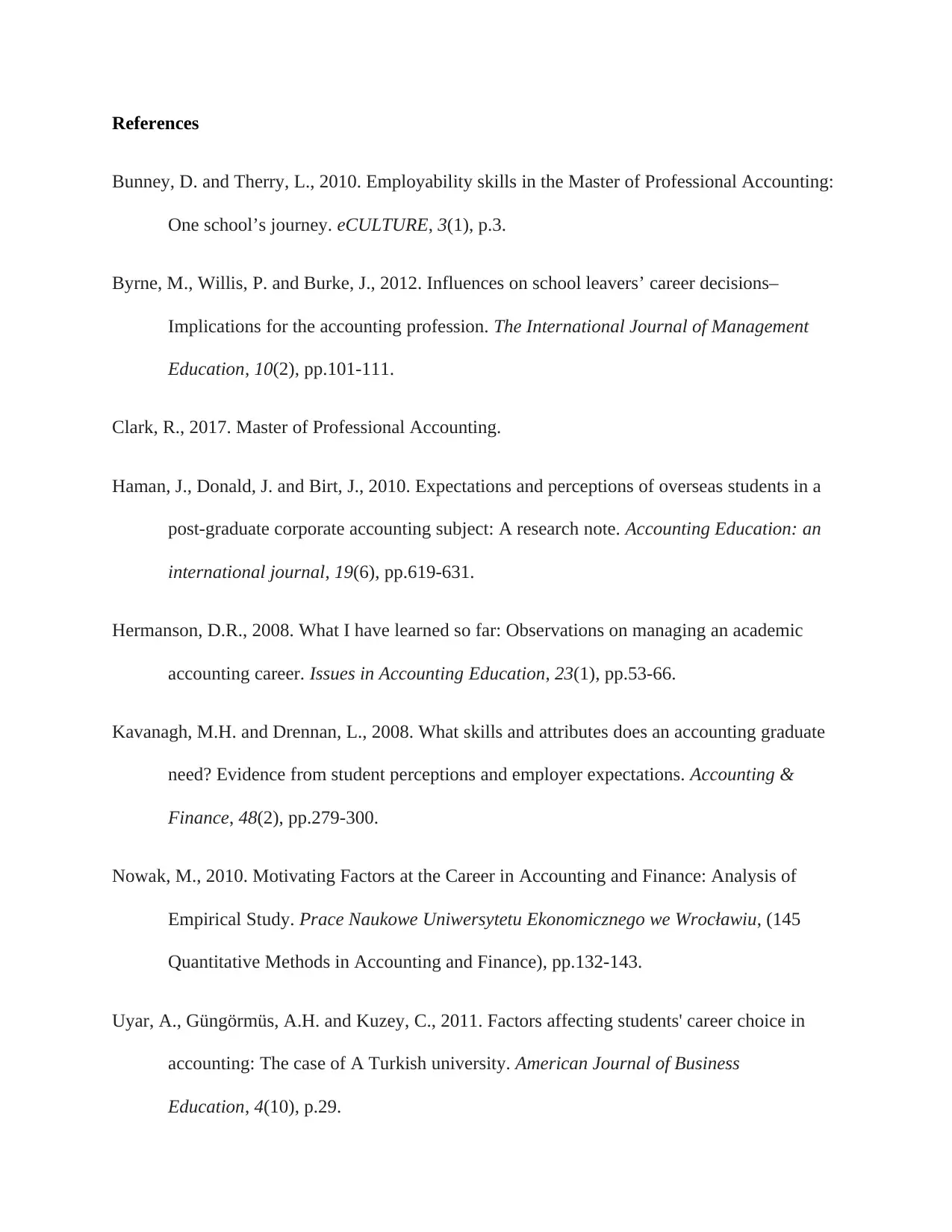
References
Bunney, D. and Therry, L., 2010. Employability skills in the Master of Professional Accounting:
One school’s journey. eCULTURE, 3(1), p.3.
Byrne, M., Willis, P. and Burke, J., 2012. Influences on school leavers’ career decisions–
Implications for the accounting profession. The International Journal of Management
Education, 10(2), pp.101-111.
Clark, R., 2017. Master of Professional Accounting.
Haman, J., Donald, J. and Birt, J., 2010. Expectations and perceptions of overseas students in a
post-graduate corporate accounting subject: A research note. Accounting Education: an
international journal, 19(6), pp.619-631.
Hermanson, D.R., 2008. What I have learned so far: Observations on managing an academic
accounting career. Issues in Accounting Education, 23(1), pp.53-66.
Kavanagh, M.H. and Drennan, L., 2008. What skills and attributes does an accounting graduate
need? Evidence from student perceptions and employer expectations. Accounting &
Finance, 48(2), pp.279-300.
Nowak, M., 2010. Motivating Factors at the Career in Accounting and Finance: Analysis of
Empirical Study. Prace Naukowe Uniwersytetu Ekonomicznego we Wrocławiu, (145
Quantitative Methods in Accounting and Finance), pp.132-143.
Uyar, A., Güngörmüs, A.H. and Kuzey, C., 2011. Factors affecting students' career choice in
accounting: The case of A Turkish university. American Journal of Business
Education, 4(10), p.29.
Bunney, D. and Therry, L., 2010. Employability skills in the Master of Professional Accounting:
One school’s journey. eCULTURE, 3(1), p.3.
Byrne, M., Willis, P. and Burke, J., 2012. Influences on school leavers’ career decisions–
Implications for the accounting profession. The International Journal of Management
Education, 10(2), pp.101-111.
Clark, R., 2017. Master of Professional Accounting.
Haman, J., Donald, J. and Birt, J., 2010. Expectations and perceptions of overseas students in a
post-graduate corporate accounting subject: A research note. Accounting Education: an
international journal, 19(6), pp.619-631.
Hermanson, D.R., 2008. What I have learned so far: Observations on managing an academic
accounting career. Issues in Accounting Education, 23(1), pp.53-66.
Kavanagh, M.H. and Drennan, L., 2008. What skills and attributes does an accounting graduate
need? Evidence from student perceptions and employer expectations. Accounting &
Finance, 48(2), pp.279-300.
Nowak, M., 2010. Motivating Factors at the Career in Accounting and Finance: Analysis of
Empirical Study. Prace Naukowe Uniwersytetu Ekonomicznego we Wrocławiu, (145
Quantitative Methods in Accounting and Finance), pp.132-143.
Uyar, A., Güngörmüs, A.H. and Kuzey, C., 2011. Factors affecting students' career choice in
accounting: The case of A Turkish university. American Journal of Business
Education, 4(10), p.29.
1 out of 5
Related Documents
Your All-in-One AI-Powered Toolkit for Academic Success.
+13062052269
info@desklib.com
Available 24*7 on WhatsApp / Email
![[object Object]](/_next/static/media/star-bottom.7253800d.svg)
Unlock your academic potential
Copyright © 2020–2026 A2Z Services. All Rights Reserved. Developed and managed by ZUCOL.





